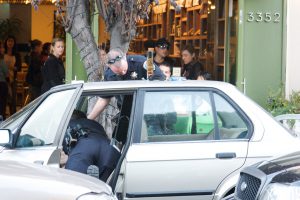Can the Police Enter a Driveway to Search a Vehicle Parked a Few Feet from Home?
Officers McCall and Rhodes of the Albemarle County Police Department were looking for a motorcycle driver who had escaped them on two separate incidents. The officers pursued the motorcycle driver because he had been going 140 mph in a 55 mile zone. The officers couldn’t continue chasing the motorcycle for safety reasons, so they used the on-board police cams to snap a picture of the license plate. Subsequent investigation indicated that the motorcycle itself was likely stolen property and that Collins had purchased the motorcycle knowing it was likely stolen.
The officers found the suspect, Ryan Collins, at a local Virginia DMV. While Officer McCall questioned Collins, Officer Rhodes searched Collin’s public Facebook profile. The search revealed a picture of a motorcycle, covered by a tarp, parked at the home of Colling’s girlfriend.After leaving the DMV, Officer Rhodesfound the house in the Facebook photograph. Since Collin often stayed at the house with his girlfriend and daughter several days a week, the lower courts considered this house to be Collin’s residence.
Officer Rhodes walked up the driveway. The driveway was enclosed on three sides: the home on one side, a brick retaining wall on the opposite side, and a brick wall in the back. Rather than knock on the door and announce himself, he searched the driveway. The motorcycle Officer Rhodes was looking for was covered in a white tarp rested hidden behind a dark tinted car. The motorcycle and car were both inside a curtilage adjacent to the house. The motorcycle laid on the side of the house. He lifted up the tarp and discovered that the motorcycle had the same license plate as the one he saw earlier and the one that was reported stolen. After confronting Collins with the evidence, Officer Rhodes arrested him.
Collins was subsequently convicted of receiving stolen property. The Virginia Appeals Court and State Supreme Court affirmed the conviction. Collins appealed to the U.S. Supreme Court, arguing that Officer Rhodes’s search of the motorcycle on his driveway without a warrant was unconstitutional. The Court has yet to make a decision as to whether they will hear the case.
 Officer Rhodes Should Not Have Searched the Motorcycle
Officer Rhodes Should Not Have Searched the Motorcycle
The entire issue in this case is whether a police officer can search a vehicle in a driveway. The Fifth Circuit has generally held that officers may not. The rest of the country, like the State of Virginia, has not limited police searches as much.
Americans are generally protected by the 4th Amendment’s prohibition against unreasonable search and seizures. To search a house, officers must have a warrant. This protection extends to objects adjacent to the house, such as trash cans. Police officers cannot walk through a person’s house or rifle through their trash unless invited or if there is an extreme emergency, such as a hot pursuit of a fugitive who bursts into a house.
However, automobiles can be exempted from such protection. If a car is readily mobile and the officer has probable cause to believe it contains contraband, an officer may search the vehicle, even if the vehicle itself is not in motion. Collins’s case presents an interesting dilemma, as the motorcycle was adjacent to the home, though not inside it. Certainty if the motorcycle were inside the garage, Officer Rhodeswould not have been permitted to go inside and remove the tarp, even if the garage door was open (but if the motorcycle was not covered by the tarp and inside the garage, Rhodes could have snapped a picture from the sidewalk).
Instead, the motorcycle was outside the structure of the dwelling and partly concealed. The prosecution would argue that the purpose of the tarp was to conceal what was otherwise observable evidence from the public sidewalk. However, the prosecution needn’t go that far; the picture was on Facebook, so Collins wasn’t intending to hide evidence. However, the tarp and the car were blocking the public view of the motorcycle underneath. Collins had a reasonable expectation of privacy when he parked the motorcycle in the driveway and it was a violation of his rights for Rhodes to lurk around his property without a warrant.
Of course, the prosecution would argue that it was necessary for Rhodes to search the driveway because Rhodes had probably cause to believe that Collins was hiding contraband (he had received stolen property) and that there was a risk that Collins would move the contraband since it was inside a vehicle could easily leave the premises.
So, What Does This Mean?
However, the dissenting opinion in the Virginia Appeals Court makes a notable distinction: that the vehicle in this case is the contraband. The automobile exception exists to ensure that suspects do not further conceal evidence after officers have located the evidence. It is unlikely that Collins would have driven off with his motorcycle to conceal it. He posted pictures of it on Facebook and it wasn’t well hidden as it was on the driveway itself.
Since the motorcycle itself was the illegal property, Rhodes and his Department could have chosen to stake out the property and wait for Collins to move the motorcycle himself. At the time of his arrest, Collins was dressed in protective motorcycle gear and had the key on his person. The officers could have arrested him as he was about to leave rather than make a potentially illegal search of the property.

 Officer Rhodes Should Not Have Searched the Motorcycle
Officer Rhodes Should Not Have Searched the Motorcycle
Comments